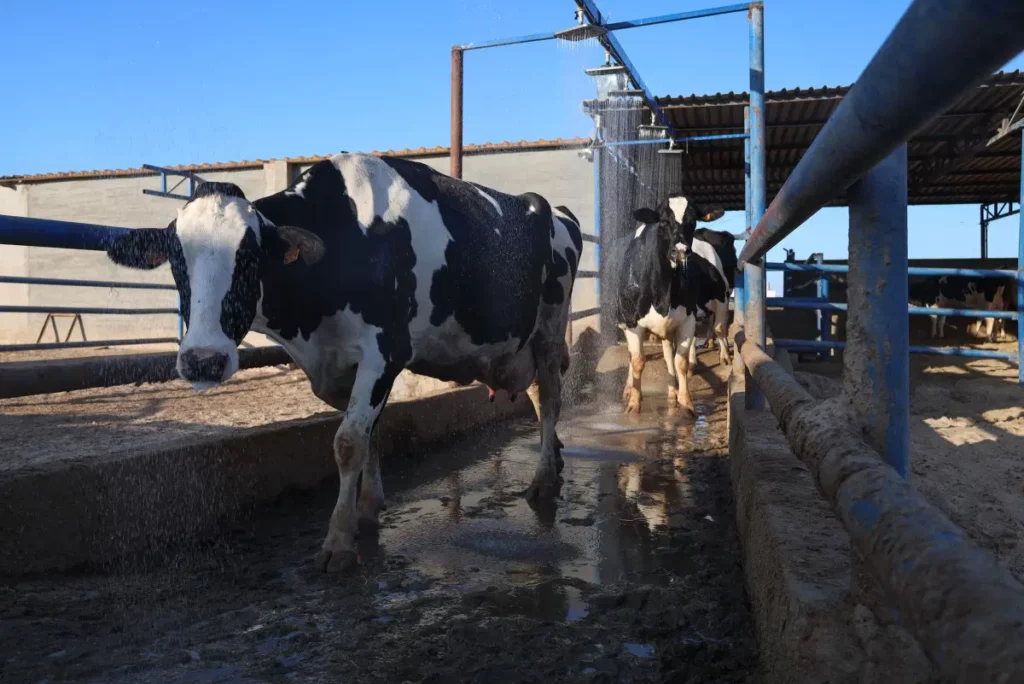By Nicholas Walter

Outbreak of livestock Disease causes chaos in Libya.At Najmeddine Tantoun’s farm near the western Libyan city of Misrata, the usual sound of hundreds of dairy milking machines has been replaced by almost complete silence.
The farmer has seen nearly half of his cows perish due to a outbreak of foot-and-mouth disease, a highly infectious sickness that impacts animals with hooves.
The epidemic in Libya has had a significant negative impact on numerous cattle breeders, who claim they have not obtained vaccines for their animals yet. The majority of the nation’s income is derived from oil reserves, but Misrata serves as a prominent dairy hub that formerly generated 70,000 liters of milk daily.
According to Salem al-Badri, 45, who leads the city’s cattle farmers committee, daily output has dropped to 20,000.
Tantoun, aged 27, expressed a pessimistic view of the future.
He said he came close to losing everything. Approximately 300 cows out of 742 were lost. This illness is ruining our means of survival as dairy and meat production is being affected by it.The illness mainly impacts ruminant animals like cows, sheep, and goats. In Misrata, farmers have reported losing approximately 70% of their cattle to the disease, which can lead to fever, blisters, and death.
During a visit to Tantoun’s farm, Badri, who is also responsible for the city’s animal health office, warned that we are on the path to a disaster. He emphasized that the significant consequences of the delayed vaccines cannot be ignored. A large portion of the cows in Misrata have contracted the infection, so we must proceed with slaughtering them in order to halt the spread of the epidemic.
Consumers are also facing financial difficulties due to the disease causing meat and dairy prices to rise with shortages.Badri mentioned that lumpy skin disease, another cattle illness, has also affected Libyan cowhide imports as foreign buyers have become cautious.
Libya is facing challenges in its efforts to bounce back from years of turmoil following the 2011 revolt which saw the removal of long-standing ruler Moamer Kadhafi.
The division still exists between a government led by Prime Minister Abdulhamid Dbeibah, recognized by the United Nations, and the opposing authority in the east supported by military leader Khalifa Haftar. Cattle breeders criticize the government for not taking proactive safety measures and for responding slowly to the outbreak, causing vaccine delivery delays to the affected areas.
Badri mentioned that had the vaccines arrived in November, we wouldn’t be in this situation.
He mentioned requesting the authorities multiple times for the vaccines to save the farms.
The authorities in Tripoli did not provide a response when contacted by AFP.Officials in both eastern and western regions have implemented urgent vaccination strategies with assistance from the UN Food and Agriculture Organization, yet certain farmers have noted that the actions have frequently been delayed.
Badri reported that a lawsuit has been filed by a group of cattle farmers with the attorney general.
The agriculture ministry attributed the spread of these diseases mainly to the illegal importation of animals without veterinary control.
Furthermore, pollution is spreading rapidly because cases are not promptly reported to the local authorities, and it was also mentioned that certain cattle may have perished without any reports being made.
Tantoun stated that their entire livelihood relied on these animals and he had sacrificed everything for the success of his farm.
Losing a large number of cows is a major economic catastrophe.He urged the authorities in Misrata to not only supply the vaccines needed but also to give compensation to cattle farmers whose cows have been affected by the illness.
Farmer Ali Ghabag stated that he has abandoned cattle farming entirely because he is concerned about the future.
The 40-year-old expressed that no one desires to remain in this industry.
“The risks have grown significantly, and the outcome of this crisis is uncertain.”














